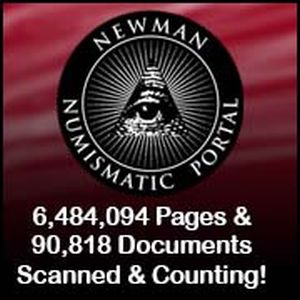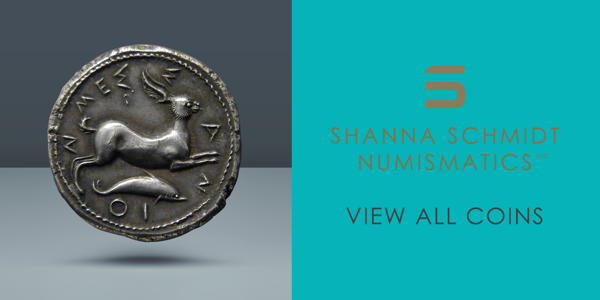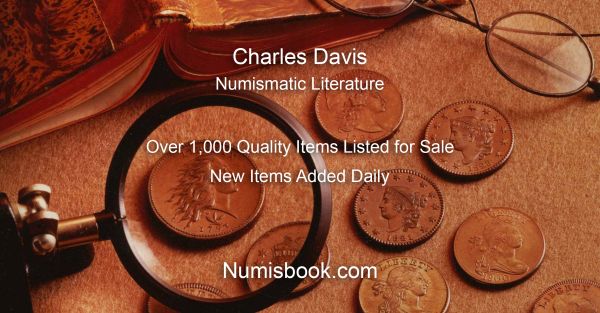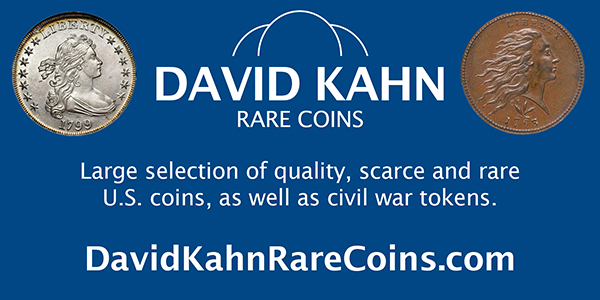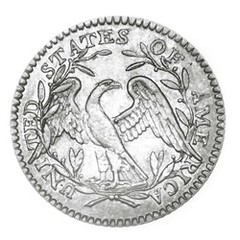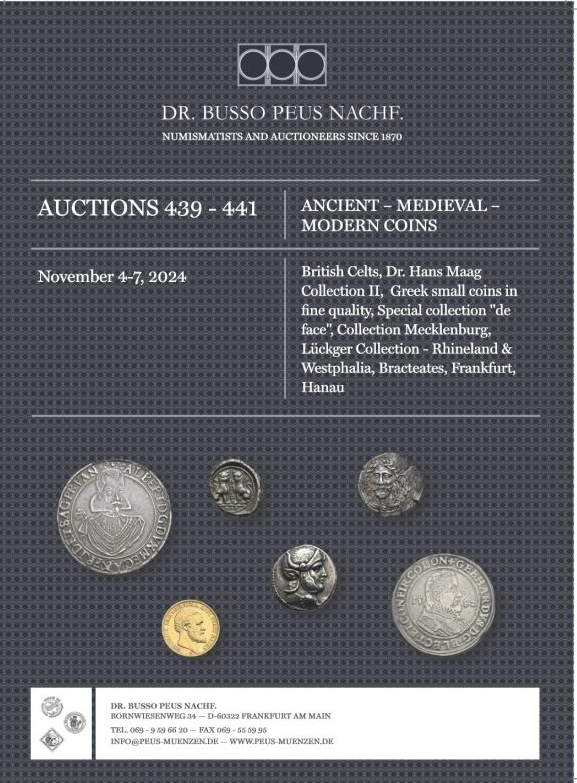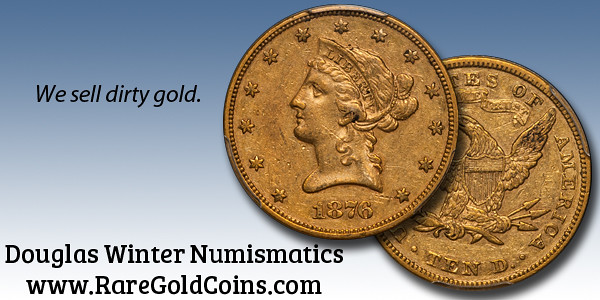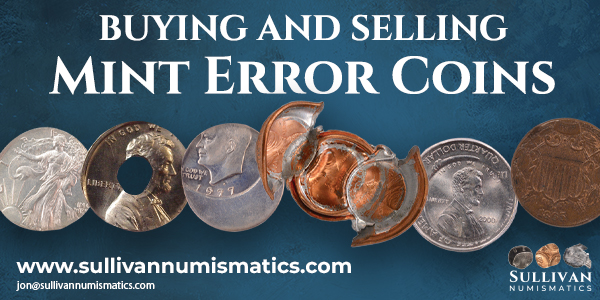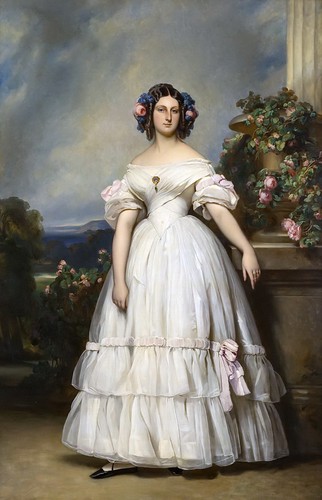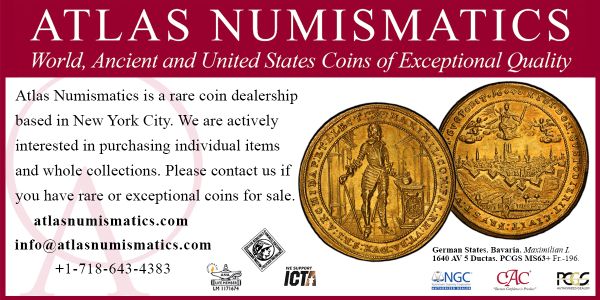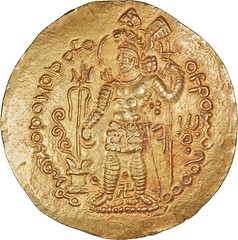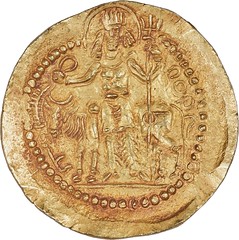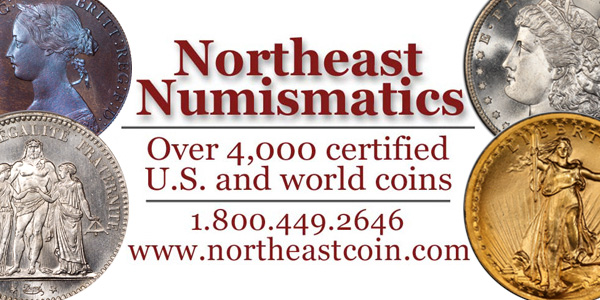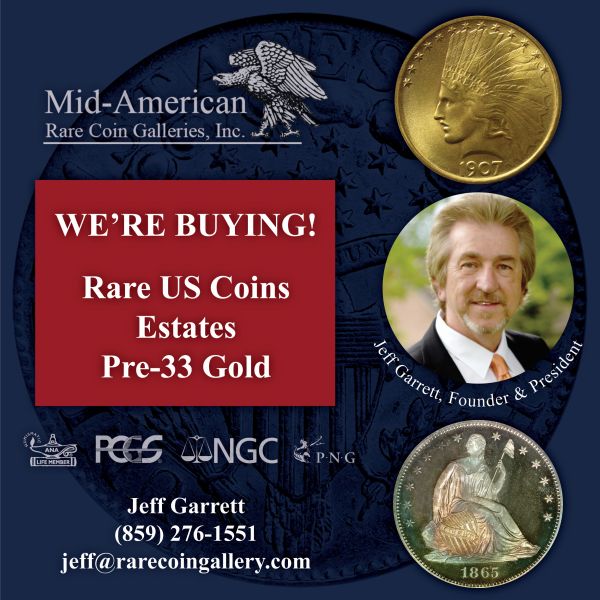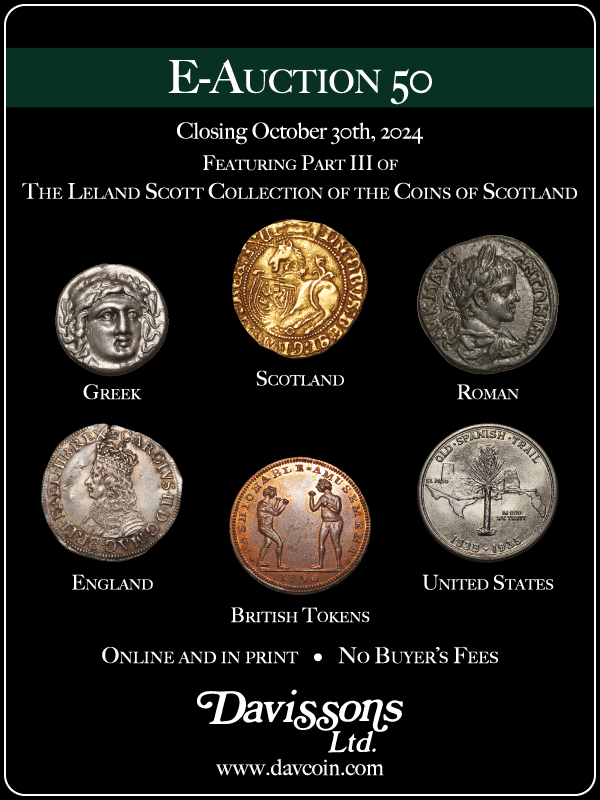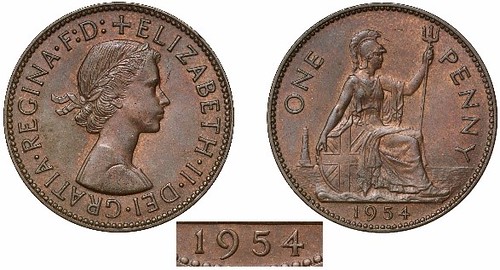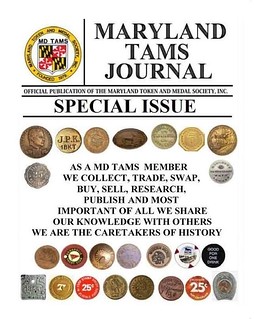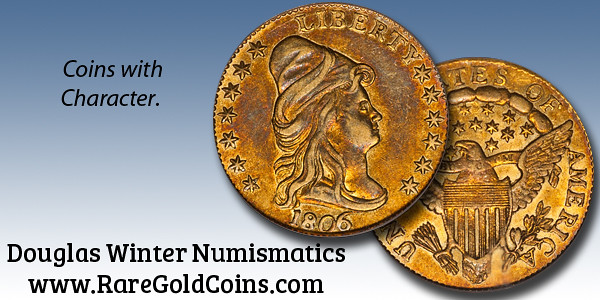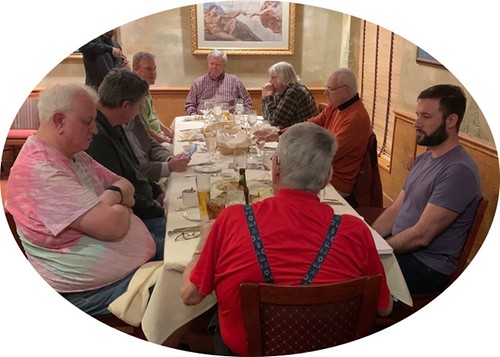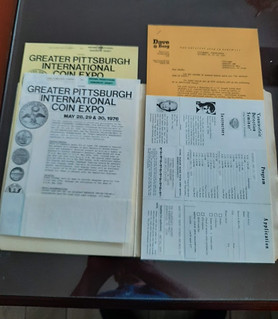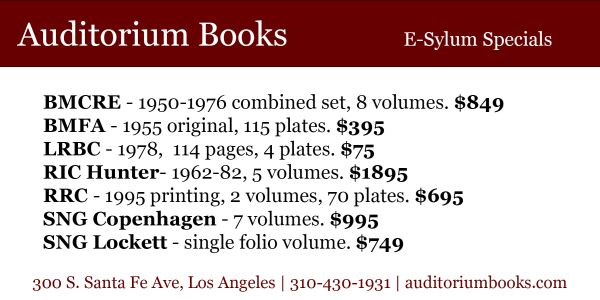
Visit our NBS Sponsors



About UsThe Numismatic Bibliomania Society is a non-profit association devoted to the study and enjoyment of numismatic literature. For more information please see our web site at coinbooks.org SubscriptionsThose wishing to become new E-Sylum subscribers (or wishing to Unsubscribe) can go to the following web page link MembershipThere is a membership application available on the web site Membership Application To join, print the application and return it with your check to the address printed on the application. Print/Digital membership is $40 to addresses in the U.S., and $60 elsewhere. A digital-only membership is available for $25. For those without web access, write to: Jeff Dickerson, Treasurer AsylumFor Asylum mailing address changes and other membership questions, contact Jeff at this email address: treasurer@coinbooks.org SubmissionsTo submit items for publication in The E-Sylum, write to the Editor at this address: whomren@gmail.com BUY THE BOOK BEFORE THE COINSale Calendar
|
- WAYNE'S WORDS: THE E-SYLUM OCTOBER 20, 2024
- KOLBE & FANNING WEB SALE NUMBER 3
- K&F BCD LIBRARY SALE, PART 2 HIGHLIGHTS
- NEW BOOK: BANKNOTES OF FINLAND
- COINSWEEKLY'S NEW NUMISMATIC DIRECTORY
- GUIDO CRAPANZANO (1938-2023)
- LOGAN-MCCLOSKEY PLATE COIN PHOTOS DIGITIZED
- THE EARLIEST SURVIVING CONFEDERATE NOTE
- NOTES FROM E-SYLUM READERS: OCTOBER 20, 2024
- 2024 BRITISH TOKEN CONGRESS REPORT
- VOCABULARY TERMS: PROOF BLANK, PROOF DIE
- HARRIET KEEFER RESTIFO (1911-2012)
- KELLEN HOARD INTERVIEW, PART TWO
- CLEMENTINE D'ORLEANS: FEMALE NUMISMATIST
- CULTURAL CURRENCY MONEY ART EXHIBIT
- ATLAS NUMISMATICS SELECTIONS: OCTOBER 20, 2024
- NUMISMAGRAM MEDAL SELECTIONS: OCTOBER 20, 2024
- HERITAGE AUCTION: INDIA PAST AND PRESENT
- THE SISI AND FRANZ NIGHTMARE WEDDING
- KUENKER AUCTION 416
- SOVEREIGN RARITIES WORKMAN COLLECTION
- STACK'S BOWERS BRUUN COLLECTION PART II
- WAYNE'S NUMISMATIC DIARY OCTOBER 20, 2024, PART ONE
- TOM'S NUMISMATIC DIARY OCTOBER 20, 2024
- WAYNE'S NUMISMATIC DIARY OCTOBER 20, 2024, PART TWO
- 1913 GOLD CARNEGIE HERO FUND MEDAL
- MASSACHUSETTS RAILROAD STOCK CERTIFICATES
- LOOSE CHANGE: OCTOBER 20, 2024
Content presented in The E-Sylum is not necessarily researched or independently fact-checked, and views expressed do not necessarily represent those of the Numismatic Bibliomania Society.
WAYNE'S WORDS: THE E-SYLUM OCTOBER 20, 2024
 New subscribers this week include:
John DeMarais and John Veech, courtesy of Larry Lee;
Carol Wolf, courtesy of Jim Glickman; and
Will Drakeley, courtesy of Garrett Ziss.
Welcome aboard! We now have 7,266 subscribers.
New subscribers this week include:
John DeMarais and John Veech, courtesy of Larry Lee;
Carol Wolf, courtesy of Jim Glickman; and
Will Drakeley, courtesy of Garrett Ziss.
Welcome aboard! We now have 7,266 subscribers.
Thank you for reading The E-Sylum. If you enjoy it, please send me the email addresses of friends you think may enjoy it as well and I'll send them a subscription. Contact me at whomren@gmail.com anytime regarding your subscription, or questions, comments or suggestions about our content.
This week we open with two numismatic literature sales, an obituary, notes from readers, updates from the Newman Numismatic Portal, and more.
Other topics this week include the earliest surviving Confederate note, the British Token Congress, Proof blanks and dies, Kellen Hoard, money art, fixed price and auction previews, Wayne and Tom's numismatic diaries, the S&S Numismatic Library, a gold Carnegie Hero medal, and stock certificates.
To learn more about Roman coinage, banknotes of Finland, Guido Crapanzano, Harriet Keefer Restifo, Kellen Hoard, Clémentine d'Orléans, skippets, Wildman Thalers, the 1954 Elizabeth II Currency Penny, and the birth of the Euro, read on. Have a great week, everyone!
Wayne Homren
Editor, The E-Sylum
KOLBE & FANNING WEB SALE NUMBER 3
Numismatic Booksellers Kolbe & Fanning have announced a new web sale closing October 23, 2024. Here's the announcement. -Editor
We will be holding the third of our new series of Web Sales of Numismatic Books on Wednesday, October 23, starting at 12:00 PM Eastern. Web Sale #3 focuses on inexpensive but useful books, catalogues and other publications on coins from all times and places. It will take place online, and all lots in the Web Sale will begin at a very low $10 opening bid.
Bidders may register for the sale, browse lots, and place absentee bids beginning immediately at bid.numislit.com.
K&F BCD LIBRARY SALE, PART 2 HIGHLIGHTS
Here are more highlights from the upcoming second sale of the BCD Library of ancient numismatics. -Editor
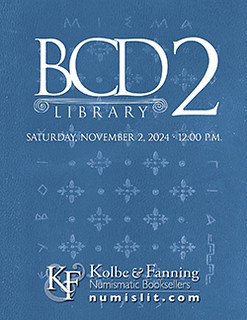 Kolbe & Fanning Numismatic Booksellers will be holding the second sale of material from the BCD Library on Saturday, November 2, beginning at 12:00 noon Eastern Time. The most extraordinary private collection of material on the coinage of antiquity that we have ever handled, the BCD Library features classic references, modern die studies of individual cities, descriptive catalogues of important collections, and much else. The online catalogue can be accessed at
bid.numislit.com.
Kolbe & Fanning Numismatic Booksellers will be holding the second sale of material from the BCD Library on Saturday, November 2, beginning at 12:00 noon Eastern Time. The most extraordinary private collection of material on the coinage of antiquity that we have ever handled, the BCD Library features classic references, modern die studies of individual cities, descriptive catalogues of important collections, and much else. The online catalogue can be accessed at
bid.numislit.com.
Some highlights of this first sale include:
NEW BOOK: BANKNOTES OF FINLAND
A free e-book published by the Bank of Finland covers the history of banknotes of the Grand Duchy of Finland. -Editor
Vom Zettel zum Geldschein: Deutsche Einflüsse auf das Design und den Druck von Banknoten im Großfürstentum Finnland
[From piece of paper to banknote: German influence on the design and printing of the banknotes of the Grand Duchy of Finland]
 The banknotes of the Grand Duchy of Finland, which was established in 1809, have been used as a starting
point in the description of the development of banknotes from a piece of paper to a trusted means of
payment. In the 18th and early 19th centuries, banknotes were commonly issued to finance wars or for some
other reason related to state finances. They often lost most of their value in the course of time due to
inflation. Numerous counterfeiting incidents heightened mistrust in them. Even though there were also
positive experiences with banknote issuance, it was not surprising that banknotes and paper money were
often viewed with disgust and treated with contempt and suspicion. They were seen as an inadequate
substitute for coins.
The banknotes of the Grand Duchy of Finland, which was established in 1809, have been used as a starting
point in the description of the development of banknotes from a piece of paper to a trusted means of
payment. In the 18th and early 19th centuries, banknotes were commonly issued to finance wars or for some
other reason related to state finances. They often lost most of their value in the course of time due to
inflation. Numerous counterfeiting incidents heightened mistrust in them. Even though there were also
positive experiences with banknote issuance, it was not surprising that banknotes and paper money were
often viewed with disgust and treated with contempt and suspicion. They were seen as an inadequate
substitute for coins.
During the 19th century, however, paper money was increasingly required to meet the needs of growing industrialisation and the liberalisation of trade. Banknotes were needed, in particular, for the larger payments required by commerce and industry. The authorities therefore took a number of steps to foster trust in banknotes. Three measures were of particular importance in this respect: the creation of a central bank monopoly over issuance, metal backing of issuance, first by silver and then by gold, and the development of the design and security of banknotes against new counterfeiting methods.
COINSWEEKLY'S NEW NUMISMATIC DIRECTORY
To mark its 15th anniversary, CoinsWeekly launched a new feature on 19 September 2024. Thousands of numismatic locations are now available at www.numismatic-directory.com. -Garrett
We all know the problem: you travel to a foreign city and want to explore its numismatic highlights, but you do not know where these numismatic highlights are. It is extremely frustrating to return home and find out that an interesting coin dealer or an exciting numismatic exhibition was just around the corner. CoinsWeekly has launched a new tool to solve this problem: the Numismatic Directory. The Numismatic Directory collects addresses of numismatic highlights all over the world and organises them geographically. You can find the Numismatic Directory in English at https://numismatic-directory.com/en/ and in German at https://numismatic-directory.com/.
GUIDO CRAPANZANO (1938-2023)
An article by Roberto Ganganelli and Gerardo Vendemia in volume 63. No. 3 of the IBNS Journal is a remembrance of former International Bank Note Society President Guido Crapanzano. With permission, we're republishing it here. -Editor
Another historical figure of Italian numismatics has left us: Guido Crapanzano passed away in Milan on December 10, 2023; for paper money enthusiasts, not only Italians, he has always been "the professor".
Guido Crapanzano – born in 1938, originally from Brescia and Milanese by adoption – was a point of reference for those, collectors or scholars, who have the banknotes of yesterday and today as the object of their interest.
LOGAN-MCCLOSKEY PLATE COIN PHOTOS DIGITIZED
The latest addition to the Newman Numismatic Portal is a gallery of Logan-McCloskey plate coin photos. Project Coordinator Len Augsburger provided the following report. -Editor
Logan-McCloskey Plate Coin Photos Digitized
In 1998, Russ Logan and John McCloskey published Federal Half Dimes 1792-1837, which expanded on the previous work by Daniel Valentine. This work entailed a significant effort, and today "LM" numbers are the standard for attributing early half dimes. NNP has recently digitized the (pre-Bust) LM plate coins from a set of photographic prints. This set includes 32 die varieties and was photographed by Tom Mulvaney
THE EARLIEST SURVIVING CONFEDERATE NOTE
Steve Feller submitted this note about a great banknote in his collection, inspired by last week's article about Confederate rarities in an upcoming Stack's Bowers sale. Thank you! -Editor
The following is from an article I wrote for Paper Money regarding the earliest known Confederate note. The article was A Great Note Finally Obtained: The Earliest Surviving Confederate Note (Paper Money LV (6) (Whole Number 306) 443-447 (2016)). The note is in my collection. It too is a Type 3 $100 CSA note from a stack's Bowers auction.
NOTES FROM E-SYLUM READERS: OCTOBER 20, 2024
Nebraska Numismatist Articles Sought
Central States Numismatic Society President Mitch Ernst writes:
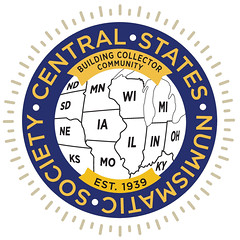 "As you may know, we at Central States have begun an exciting program of bringing one of our thirteen states into the spotlight each year at our convention. We call it the "State Showcase" program. Well, 2025 will be Nebraska. We are looking for articles about some of Nebraska premiere numismatic personalities particularly Aubrey Bebee and J. Hewitt Judd, both of whom are from Nebraska. Both making and having an important impact on the hobby. We are looking for articles!
"As you may know, we at Central States have begun an exciting program of bringing one of our thirteen states into the spotlight each year at our convention. We call it the "State Showcase" program. Well, 2025 will be Nebraska. We are looking for articles about some of Nebraska premiere numismatic personalities particularly Aubrey Bebee and J. Hewitt Judd, both of whom are from Nebraska. Both making and having an important impact on the hobby. We are looking for articles!
"If any of your readers have or can share a biographical article about either or both of the aforementioned Nebraska Numismatic dignitaries, may I request that they submit their proposal to our editor, Barbara Gregory for inclusion in our magazine The Centinel? Please email editor@csns.org. Thank you!"
Great project. Can anyone help? -Editor
For more information on the Central States Numismatic Society, see:
https://www.csns.org/
Other topics this week include skippets, and the US Mutilated Coin Program. -Editor
2024 BRITISH TOKEN CONGRESS REPORT
Jeff Rock attended the recent British Token Congress and filed this report for our readers. Thank you! -Editor
The 42nd annual British Token Congress took place in Northampton, a short hour-long train ride outside of London on October 4-6 2024. This is one of the most unique events in numismatics – as well as one of the biggest bargains! From Friday afternoon until Sunday afternoon the attendees were treated to fifteen different talks, ranging from 10 minutes to just under an hour, on all types of token topics. Talks are usually heavy on the 17th century issues, but this year saw a surprising amount of 18th century content, the ever-popular Conder token series that has captivated American collectors for decades. There was even a talk that veered into colonial American coinage, an excellent discussion on the Somers Islands "hogge money," which was recorded and will be made available to collectors.
VOCABULARY TERMS: PROOF BLANK, PROOF DIE
Here are two short entries from Dick Johnson's Encyclopedia of Coin and Medal Terminology. -Editor
Proof Blank. An extensively cleaned and polished planchet intended to be struck by proof polished dies to create a struck piece in mirror-like proof finish. Blanks for proof coins are treated exactly like other blanks except they are carefully polished to a mirror-like surface and inspected prior to use. Generally proof blanks are airblasted with compressed air to remove any contaminates as even lint can mar the mirror surface. For a proof striking, press operators wearing protective gloves hand feed the planchets (as perspiration from bare fingers will soil the surface as well). Proof strikes can only be created from such polished blanks and mirror-like polished dies. They are also called FLAN BRUNI (French for burnished blank[RWB2] ).
HARRIET KEEFER RESTIFO (1911-2012)
E-Sylum Feature Writer and American Numismatic Biographies author Pete Smith submitted this article on coin columnist Harriet Keefer Restifo. Thanks! -Editor
Last week I fell five months short in my attempt to identify a 100-year-old numismatist. The one mentioned this week made the century mark with seven months to spare.
Harriet Miller was born in Somerset, Pennsylvania, on July 26, 1911, the daughter of Aden Kent Miller (1883-1948) and Elsie Statler Miller (1889-1982). Alden was the manager of a farm supply store.
KELLEN HOARD INTERVIEW, PART TWO
Greg Bennick's latest interview for the Newman Numismatic Portal is with Young Numismatist Kellen Hoard. Here's the second part, where Kellen discusses how he became interested in numismatics and more about engaging young collectors. -Garrett
GREG BENNICK: That's great. That's great. I love it. So, okay. So, what do you collect and how did you get your start in collecting given that myriad of things you could have been interested in that you mentioned a few minutes ago?
 KELLEN HOARD: Yeah. So, I'll start, I'll start with the start. My grandparents used to travel quite a bit. They weren't collectors themselves, but they'd accumulate foreign coins in their travels and they'd always bring them back to me. I would take them and put them in a jar in my room and not really look at them much further. But one day when I was about nine, I said, "I should probably take a look at those." So, I dumped them out of a jar, and started taking a look at them. They really were quite compelling to me. So, I started out... I put foreign coins in two by twos that I got for Christmas. I did the 50 state quarters as well.
KELLEN HOARD: Yeah. So, I'll start, I'll start with the start. My grandparents used to travel quite a bit. They weren't collectors themselves, but they'd accumulate foreign coins in their travels and they'd always bring them back to me. I would take them and put them in a jar in my room and not really look at them much further. But one day when I was about nine, I said, "I should probably take a look at those." So, I dumped them out of a jar, and started taking a look at them. They really were quite compelling to me. So, I started out... I put foreign coins in two by twos that I got for Christmas. I did the 50 state quarters as well.
So that was the start. It was U.S. coins and foreign coins as my first two categories. Of course, it's narrowed since then. What am I collecting right now? That is a good question. That's a question I'm asking myself. What am I collecting right now? A couple of different things. One of the ones that has persistently been interesting, but is a sub niche of a sub niche, is sample slabs. For those who aren't familiar this is basically when grading services will give out holders promotionally at shows or to YNs or at luncheons or any number of different occasions. They'll give out these holders and they usually say "sample" on them. Not always though. There's an active debate about what exactly is a sample slab when there are so many different gray areas with so many different kinds of slabs.
But I've been collecting those for a long time. It's a neat field because there's constantly new ones being made and not just by a couple of services, but by a bunch of what we call "basement graders," people who set up shop in their basement to grade everything as 70 for three days and then quit. They also happen to make samples labs. So, I've been collecting them. It's neat because there's constantly new ones being discovered. You have a chance to really find things nobody's seen before, and that's really quite a bit of fun.
GREG BENNICK: And where not many were made. Probably very limited.
KELLEN HOARD: But of course, it's a supply and demand thing, right? I have a sample slab of which one in the world exists and it's worth maybe a couple hundred dollars. A unique coin in the US federal series is going to be millions, right? You definitely see that sense of scale there. I've been doing that for a while. I have a great time doing that. I collect numismatic literature. That's one of many shelves. I have been recently collecting exonumia from my hometown of Kirkland, Washington, so I'm having a great time tracking down what even exists in that set as well. Not only that, but taking advantage of, actually, the hunt. The thrill of the hunt.
There was a local bar that issued tokens in the forties. So I went to the bar. I've never been there before. I'm amazed they let me in. I'm underage. But I went to the local bar and tracked down a guy who had been going there for decades and was able to talk to him and track down some of these pieces. So, it's fun. It's like a treasure hunt to figure out what you can do.
I'm an international affairs student. So, I've also been trying to trace, 20th century geopolitics through numismatics. You can see changes to money and all this kind of stuff.
So those are a couple of different things. The big coup for me though, was that I was at a coin shop, maybe about a year ago. My girlfriend happened to be in the car with me. We pulled over and I said, "Could you come in and just hang out with me for a couple of minutes while I look at this?" And she said, "Yes." Again, wonderful for her to do that. When I went inside to look at the coins, I said, "Why don't you just go look through that junk box of foreign coins and see what catches your eye?"
By the time I finished my business, I asked, "Are you ready to go?" She said, "No, no, no. I'm looking through this box." She said, "I'm really quite interested." She pulled out maybe like 25 different coins that she liked and they were about 25 cents apiece. So, I bought them for her. And on the ride home, she was fascinated by them. She loved the designs and she liked Googling to find the story behind those designs. She's quite the traveler. I suggested that we collect one coin from every country as a kind of a fun little set, in line with her traveling. And we're doing that together now. I don't think she realizes she's collecting coins.
We're keeping it that way. It's been great. We're collecting coins together. I just don't think she realizes that we are. That's been quite nice.
The only other thing I collect is things for that reference set I mentioned earlier to share with people something that will catch people's interest.
GREG BENNICK: That's amazing. I love the top secret, backhanded way of getting your partner to collect coins. It's brilliant.
KELLEN HOARD: Yeah, that's been the approach so far. We've built up quite a set. The real difficulty, honestly, was figuring out which countries to include, because you can do, you know, UN member states. But does that include countries like Kosovo or Palestine or different ones like this? No. There's endless gray areas. So, we chose which microstates to include and things like that. So, it's been fun in that way as well.
GREG BENNICK: I love this. Good work. That's fantastic. That's a great way of bringing in a new collector. You know, people all the time are trying to figure out how to bring in new collectors and what's the angle. And I guess the angle is get them to collect without realizing they're collecting. That's a new Kellen Hoard technique, a patented copyright.
KELLEN HOARD: Maybe not a sustainable approach, but definitely, one to get them.
GREG BENNICK: I think I might try that. I might try that with, my girlfriend and say, I really like circles. Circles are really interesting. Oh, these things have circles. Let's, let's collect these.
KELLEN HOARD: Well, honestly, not just circles. There's so many shapes. There was, an article in The Numismatist maybe a decade ago about like someone trying to collect every number of signs, as many signs as they could. There you go. You know, interesting geometry. There's great opportunity.
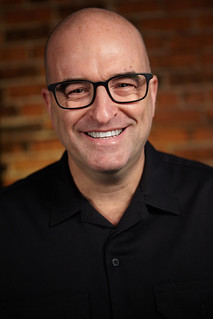 About the Interviewer
About the Interviewer
Greg Bennick (www.gregbennick.com) is a keynote speaker and long time coin collector with a focus on major mint error coins. Have ideas for other interviewees? Contact him anytime on the web or via instagram @minterrors.
To watch the complete video, see:
Kellen Hoard Interviewed for the NNP by Greg Bennick
(https://youtu.be/tBb-Bt4NR8k)
To read the complete transcript, see:
Kellen Hoard Interviewed for the NNP by Greg Bennick (Transcript)
(https://nnp.wustl.edu/library/book/641580)
To read the earlier E-Sylum article, see:
KELLEN HOARD INTERVIEW, PART ONE
(https://www.coinbooks.org/v27/esylum_v27n41a24.html)
CLEMENTINE D'ORLEANS: FEMALE NUMISMATIST
Künker recently released this article on female coin collector Clémentine d'Orléans. Her collection will be sold as part of the estate of Dr. Alexander Eugen Duke of Württemberg, the final part of which will be sold in Künker's upcoming Auction 415 on 28 October 2024. -Garrett
On 3 June 1817, Maria Amalia of Naples and Sicily, wife of Louis Philippe, Duke of Orléans, gave birth to her sixth of what would eventually be ten children: a daughter, elaborately christened Marie Clémentine Léopoldine Caroline Clotilde. At the time of her birth, Louis Philippe was far from a contender for the throne. He was serving as general in the French army and was a loyal supporter of the recently restored Bourbons Louis XVIII and Charles X.
There may have been a slight uneasiness, however, as Louis Philippe's father – an enthusiastic supporter of the Enlightenment – had supported the French Revolution under the name Philippe égalité. Although, like many others, he had died on the guillotine during the Reign of Terror, he had raised his son according to the ideals of a new, enlightened and economically strong bourgeoisie. Maybe this is what gave Louis Philippe his uncanny ability to read the signs of the times. He traveled to England and the United States and had discussions with (for that time) progressive politicians like George Washington and Alexander Hamilton. At the same time, though, he also maintained strong ties to important banking houses such as Rothschild and Laffitte.
Louis Philippe perfectly knew how to handle money, including his own. He used the most modern investment methods to expand the already enormous family fortune. Even before his accession to the throne, Louis Philippe was one of the wealthiest men in France. As early as 1821, his fortune was estimated at around 8 million francs – and it was to increase considerably.
CULTURAL CURRENCY MONEY ART EXHIBIT
John Mellman passed along information about an upcoming exhibit of money art at the Carlsbad Museum in New Mexico. Thanks! "Cultural Currency: Contemporary Art from the Riemer Collection" is a traveling exhibit appearing at Carlsbad November 1, 2024 through January 24, 2025. Their site has little information, but I was able to find more at the websites of museums where the exhibit has toured before. -Editor
Cultural Currency explores the innovative ways artists use money as a medium to expand its worth beyond a given denomination. Each of the artists featured investigates preconceived definitions of monetary value, meticulously repurposing bills and coins into exquisite, precise artworks. Universally relevant, humorous and, at times, critical, Cultural Currency asks viewers to consider how the definition of currency can be reshaped into a multifaceted object steeped in meaning and intrigue. The collection is the passion of Louise Rothman-Riemer and Davis Riemer, investment advisers from Oakland, California, who began collecting money-themed art in 1995 to encourage new attitudes toward money's intrinsic value.
ATLAS NUMISMATICS SELECTIONS: OCTOBER 20, 2024
Atlas Numismatics has updated their website with 376 new coins, medals, and tokens at fixed prices. Selections include the following items. Some great pieces! -Editor
1080272 | GREEK. PTOLEMAIC KINGS OF EGYPT. Ptolemy VI. Struck circa 180-145 BC. AR Tetradrachm. NGC Ch. AU? (Choice About Uncirculated ?) Strike 5/5 Surface 5/5. Alexandreia Mint. 14.03gm. Diademed head of Ptolemy I right, wearing aegis around neck / Eagle standing left on thunderbolt; no control marks. Svor-1231 & 1489; SNG Cop-244-5 & 262-8.
Beautiful deep cabinet patina; given the star designation by NGC for exceptional eye appeal.
$6,950
NUMISMAGRAM MEDAL SELECTIONS: OCTOBER 20, 2024
Jeremy Bostwick with Numismagram forwarded these three medals from his upload of new Halloween-themed medallic art to his site. For all of the new items, please visit https://www.numismagram.com/inventory, and be on the lookout for more being added this week. Some great medals! -Editor
102943 | GREAT BRITAIN. Warwickshire. Birmingham. Copper Penny Token. Issued 1791 (34mm, 16.96 g, 12h). OUR FOOD IS SEDITION, winged and serpentine Monster of Sedition carrying flag with phrygian cap; four imps flying around (three of which are suckling from her numerous teats) // NOURISHED TO TORMENT, snake basking in long grass; the sun's rays above; in two lines in exergue, 14 JULY / 1791. Edge: A few scattered marks, otherwise plain. D&H 34; BHM 360. Extremely Fine. Warm brown surfaces; minor edge flaw noted for completeness. $395.
Alluding to the Birmingham riots of 1791 as well as the second anniversary of the French Revolution, this type remains exceptionally popular on account of its haunting imagery.
To read the complete item description, see:
102943 | GREAT BRITAIN. Warwickshire. Birmingham. Copper Penny Token.
(https://www.numismagram.com/product-page/102943)
HERITAGE AUCTION: INDIA PAST AND PRESENT
Heritage Auctions will be hosting their India: Past and Present Spotlight Auction on October 28. Some selections from their October 15, 2024 Heritage Coin News email are discussed below. -Garrett
Our October 28 Spotlight India: Past and Present Auction highlights the rich and diverse numismatic history of the Indian subcontinent. This impressive auction features an array of Hunnic and Kushano-Sasanian issues, alongside fine selections from Bactrian and Indo-Scythian eras. Mughal enthusiasts will appreciate a handful of truly choice gold issues, complemented by stunning silver and gold pieces from Hyderabad. Rounding out the Showcase is a large offering of mint state examples from British India, sure to captivate collectors of Indian coinage through the ages.
A remarkable chapter in the annals of Central Asian history is the era of the Kushano-Sasanian Kingdom from the mid-third century to the mid-fifth century AD, flourishing as a historical intersection of the Kushan and the Sasanian Empires. While the Kushans were a major power in South and Central Asia, the Sasanians hailed from Persia, creating an intriguing blend of cultures and traditions within the kingdom. Hormizd I is predominantly known for his significant role in fostering cultural syncretism during his reign. As mentioned above, this auction has a nice offering of Kushano-Sasanian issues, led by an AU gold dinar of Hormizd I Kushanshah (Ohrmazd) struck ca. AD 285-300.
The Indian subcontinent has produced a wide variety of coinage through the years, including:
THE SISI AND FRANZ NIGHTMARE WEDDING
As part of the phaleristic auction 415 on 28 October 2024, Künker will be auctioning the set of gold medals that Emperor Franz Joseph presented to his father-in-law, Duke Maximilian Joseph in Bavaria. It is the numismatic souvenir of a wedding that turned out to be a nightmare for his daughter – young Elisabeth, who is better known as Sissi or Sisi today. -Garrett
Sisi and Franz: Commemorating the Dream Wedding that Was Actually a Nightmare
by Ursula Kampmann on behalf of Künker

Official commemorative set with two gold medals with the weight of 35 ducats each from the estate of Max Joseph in Bavaria, the father of Empress Elisabeth of Austria-Hungary. Estimate: 40,000 euros. From Künker auction 415 (28 October 2024), No. 361.
On Saturday, 22 April 1854, at 4 p.m. on the dot, the paddle steamer Franz Joseph docked at Nussdorf near Vienna to the sound of celebratory gunfire and shouts of "vivat". On board was a frightened 16-year-old, struggling to keep her composure. Dressed in pink silk, she stood and waved with her lace handkerchief at the cheering crowd that was eager to catch a glimpse of their future empress. Tens of thousands of people crowded along the riverbanks and streets, peering out of windows and from stands, just to cast a glance at the future ruler of their country. The latter let all the speeches and greetings, all the poems and tributes wash over her without complaint before the procession of carriages finally formed to take the entire court to Schönbrunn.
KUENKER AUCTION 416
Künker's auction 416 presents exquisite coins from the ancient world. Highlights are the Druckrey Collection of Greek coins, a Brutus aureus, as well as the collection of Clémentine d'Orléans, daughter of Citizen King Louis Philippe and mother of Tsar Ferdinand I of Bulgaria. -Garrett
Künker, Osnabrück
Auction 416
Osnabrück, 29-30 October 2024
Ancient Greek Coins from the Druckrey Collection at Künker
On 29 and 30 October 2024, the Künker auction house will hold auction 416. It contains 1038 lots with select Greek, Celtic, Roman and Byzantine coins as well as issues from the Migration Period and the Islamic world. We present a few highlights.
SOVEREIGN RARITIES WORKMAN COLLECTION
Sovereign Rarities is offering a great collection of penny rarities in next month's sale. Here's the announcement. -Editor
Sovereign Rarities of London UK are proud to present for auction on November 19th 2024 the Bernard Workman Collection of Bronze Penny Rarities 1860-1967 – a scintillating selection of forty of the most elusive pennies from the reigns of Queen Victoria to Queen Elizabeth II, the most valuable rarity being the unique 1954 currency Penny.
STACK'S BOWERS BRUUN COLLECTION PART II
Here's a preview from Stack's Bowers Galleries of their second sale of the Bruun collection, coming up in March. Some beautiful coins here. -Editor
 Stack's Bowers Galleries is proud to announce the auction of Part II of the famed L. E. Bruun Collection, the world's finest private collection of Scandinavian coinage, which has been insured for 500 million Danish kroner (about US$72.5 million). The auction will be held March 13-16, 2025, at the Hotel Baur au Lac in Zurich, Switzerland.
Stack's Bowers Galleries is proud to announce the auction of Part II of the famed L. E. Bruun Collection, the world's finest private collection of Scandinavian coinage, which has been insured for 500 million Danish kroner (about US$72.5 million). The auction will be held March 13-16, 2025, at the Hotel Baur au Lac in Zurich, Switzerland.
Part II follows quickly on the heels of the inaugural auction of the L. E. Bruun Collection: A Corpus of Scandinavian Monetary History. Held on September 14, 2024, in Copenhagen, Part I's prices realized totaled €14,820,900 (approximately US$16.5 million), a record for a single numismatic auction in Scandinavia. Among the sale's 286 Danish, Norwegian, and Swedish coins were many individual recording-setting prices, led by the unique in private hands Danish gold Noble of King Hans that sold for €1,200,000 (approximately US$1.33 million), more than three times the previous world record for a Scandinavian coin.
Part II will offer a wider spectrum of Scandinavian numismatics, ranging from the Viking period through the 19th century, with a broader geographic reach as well. Augmenting the core Danish, Norwegian and Swedish items will be an extensive and much-anticipated offering of coins from the Danish duchies of Schleswig-Holstein, an area that was long under Danish rule but was lost to Germany after the Second Schleswig War in 1864.
THE BOOK BAZARRE
WAYNE'S NUMISMATIC DIARY OCTOBER 20, 2024, PART ONE
The months roll by fast. After work on Tuesday, October 15, 2024 I pointed my car to Ristorante Bonaroti in Vienna for the monthly dinner meeting of my Northern Virginia Numismatic Social Group, Nummis Nova. Daryl Haynor was our host and the first member I met upon walking in. As usual we were seated at a long table in the back room and had the room to ourselves.
I sat across from Daryl and between Lorne LaVertu and Jon Radel. Roger Burdette was at the head of our end of the table. Other attendees this month included Steve Bishop, Robert Hoppensteadt, Mike Markowitz, Tom Kays, Julian Leidman and Julian's guest Erik Douglas.
I brought along one book and one medal, shown here atop my menu.
TOM'S NUMISMATIC DIARY OCTOBER 20, 2024
Tom Kays provided this great write-up of the evening, and the other rare and interesting items passing around the room. Thank you! -Editor
Nummis Nova regulars had to wind our way through the antechambers of Ristorante Bonaroti, an excellent, family-run Italian Restaurant for the past thirty years, where you are treated like royalty and can have a normal, unhurried conversation with your dinner guests. Northern Virginia is quite near to Washington D.C., so that the common area was already stuffed full of famous politicians, former Speakers of the House, senator's wives, and lobbyists all dressed to the nines, whom we had to pass to get back to our exclusive private dining room. Heads must have turned wondering who this mysterious league of scruffy gentlemen in casual, comfortable clothing could be, carrying satchels and briefcases to dinner? We dress informally for fine dining like billionaires do, and not like mere millionaires who worry about making an impression in their stuffy formal attire, still scrounging for that next million. As we take our seats the waiters see us set up all sorts of penlights, tabletop magnifiers, ultra-violet lights, special lenses, analyzers, and assemble makeshift photo stages out of menus and appetizer plates. Perhaps they wonder if we are international diamond merchants?
WAYNE'S NUMISMATIC DIARY OCTOBER 20, 2024, PART TWO
As Tom noted, although a longstanding low-level pain issue didn't keep me from running the race, a visit to a foot doctor led to his recommendation that I no longer run. I was really bummed out to hear that. I was looking forward to future races. As an official Senior Citizen, the news had an ominous feel - "first they come for your running shoes, then they come for your car keys." It felt like my world was getting smaller, and a reminder that my life was getting shorter. But he said walking was fine for me, so thankfully I can still enjoy that. I didn't run fast anyway.
It was another great night of numismatic fellowship, but my adventure continued with a Newman Numismatic Portal meeting at the S&S Library in Chicago.
The S&S Library
I was back at Dulles airport Friday morning. I parked in the garage for a quick trip. I didn't even take my laptop with me, which is unusual. I traveled light with just a backpack. In addition to a change of clothes I carried a group of material I received from Ed Krivoniak of Pittsburgh. The folders of papers relating to Western Pennsylvania clubs and coin shows will be digitized by NNP.
1913 GOLD CARNEGIE HERO FUND MEDAL
In their November 2024 Showcase Auction, Stack's Bowers is offering a rare gold Carnegie Hero medal. -Editor
(1913) Carnegie Hero Fund Medal. Gold. Awarded to Julius B. Gordon. Mint State, Engraving Effaced.
76 mm. 10.8 ounces, .999 fine, 9.84 troy ounces AGW. Marked on the edge at 6 o'clock 24 K J.E. CALDWELL & CO. PHILA. PAT. DEC. 11. '06. These important medals - the civilian equivalent to the Congressional Medal of Honor - were first awarded in 1904. On March 12 of that year Andrew Carnegie began a Hero Fund commission in Philadelphia to recognize acts of bravery by ordinary Americans. Between 1904 and 2015 the Fund awarded 9,975 medals (and they continue to do so) but, while initially awarded in gold, silver and bronze, the vast majority have been in bronze. Rising precious metals costs forced the elimination of the gold award after only 19 were distributed, the last to Charles L. Coe of Burkburnett, Texas, who died in a fire rescue act in 1923. The silver award followed suit in 1981, after 617 had been distributed, the last to Brian Mervyn Clegg and Robert Stephen Grant for rescue acts performed in 1979.
MASSACHUSETTS RAILROAD STOCK CERTIFICATES
We recently discussed ScripoTime, a new site for collectors of stock certificates and other financial documents. With permission, we're excerpting one of the articles, originally written and published by G.Labarre in The LaBarre Newsletter, Issue 1, Winter 1981. Thanks. -Editor
Stock and bond certificates and shares are more than mere representations of wealth or financial gain. More than that, they are reflections of human endeavor, industrial expansion and the growth of this nation. Each has its own unique and fascinating story to tell. With those important points in mind, it is both interesting and useful for collectors and investors to be aware of historical background of companies that have issued stocks or bonds to finance their development and growth. This first issue of the "Stock and Bond Investment Quarterly" will discuss a perennial favorite of many types of collectors; railroad companies.
Taunton Branch Railroad Company, Massachusetts
LOOSE CHANGE: OCTOBER 20, 2024
Here are some additional items in the media this week that may be of interest. -Editor
An article by Ursula Kampmann on behalf of Künker examines numismatic testaments to the consecration of Roman Emperors. -Editor
Vae, puto deus fio – oh dear, I think I'm becoming a god, Vespasian is said to have joked when he experienced the first symptoms of the disease that would kill him later. Actually, it might be the case that Suetonius was indulging in anachronism at this point. After all, at the time of Vespasian's death in 79 AD, it was not as common for members of the imperial family to be deified as it was when Suetonius died in 122. Between the deaths of Augustus and Vespasian, only one emperor was divinized: Claudius. And Seneca's Apocolocynthosis gives us an idea of how weird his contemporaries found this practice: the title Apocolocynthosis is based on the Roman term for deification (apotheosis), and it refers to something being transformed into a pumpkin.
It was not until Titus and his brother Domitian that the deification of one's ancestors was systematically used as a political means by the emperors. To establish this practice as a ritual, they took their inspiration from the deification of Augustus.
To read the complete article, see:
Oh Dear, I Think I'm Becoming a God! Numismatic Testaments to the Consecration of Roman Emperors
(https://www.kuenker.de/de/information/presseinformationen/aktuelle-mitteilungen/595)
Other topics this week include the birth of the Euro, and a rare early printing of the U.S. Constitution. -Editor

